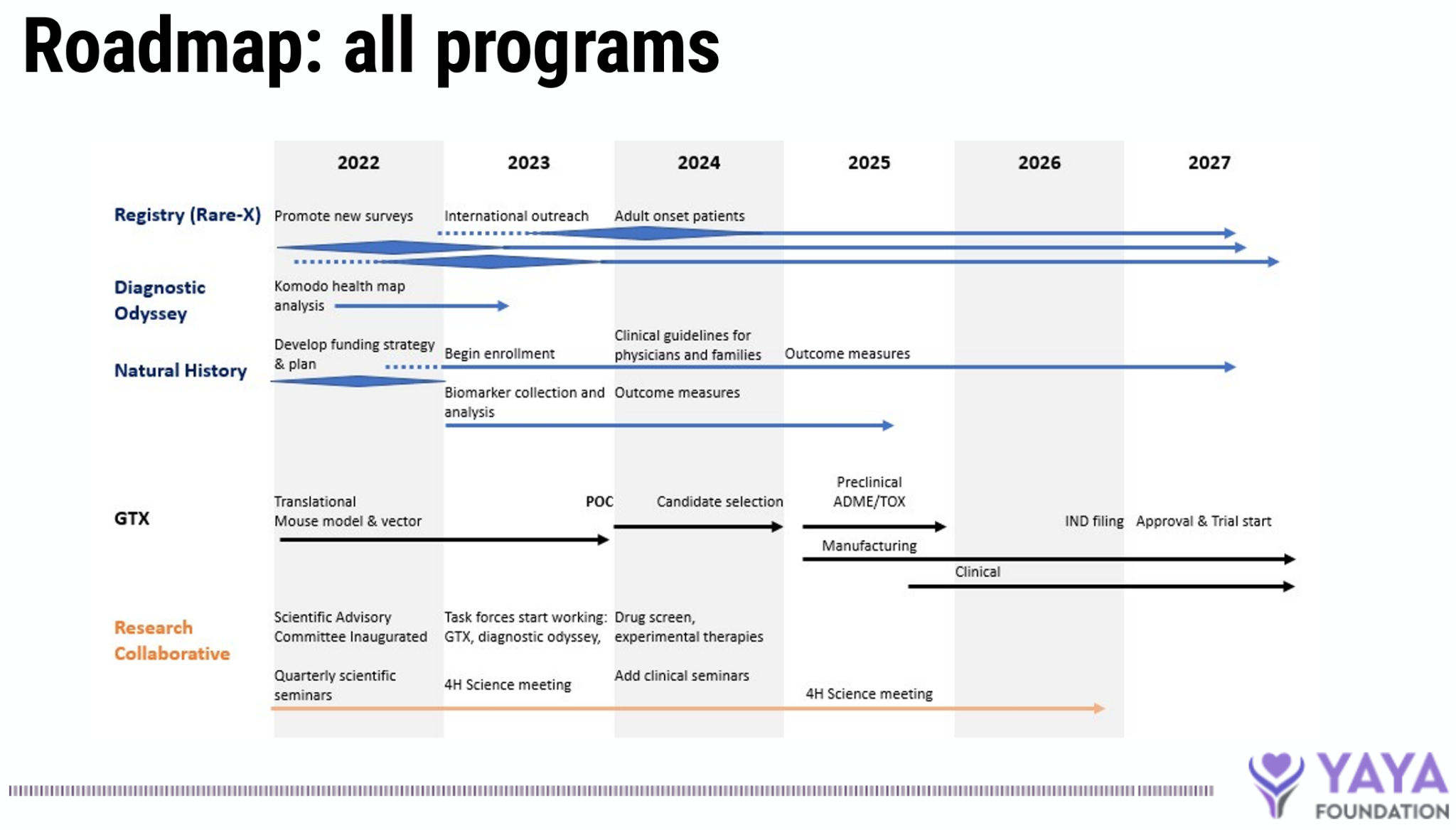Research Roadmap
Where we started:
One our our goals at the Yaya Foundation is to accelerate and support research that will help to:
- Better understand 4H Leukodystrophy
- Develop therapies that will help patients with 4H Leukodystrophy
- Find a cure for 4H Leukodystrophy
Our approach to achieve these goals is two-pronged:
- Raise money to support relevant research through grant awards
- Develop a collaborative network of scientist and clinicians dedicated to 4H Leukodystrophy research and connect it with our families
In November 2020, the Yaya Foundation gathered scientific experts, clinicians, the members of our advisory board and parents to take stock about what we do and don’t know about 4H Leukodystrophy, what resources are available and what is missing, and to chart the best way towards a therapy and cure. Based on these discussions and many follow-up conversations we developed the research roadmap for the Yaya Foundation. We identified several work areas that should be given priority:
Cure – Gene therapy: Currently the most advanced approach towards finding a cure for 4H Leukodystrophy is gene replacement therapy. The Yaya Foundation’s first grant award funded a collaboration between Dr Bernard’s, Dr Gao’s and Dr Xie’s group to develop the vectors that carry the normal gene to oligodendrocytes and to show that this restores function or leads to desired change in biomarker(s) in the mouse model for 4H Leukodystrophy.
Tools and Models: Disease models are essential to all stages of research. Depending on the experiment, the model may be an animal (such as a mouse) that carries a mutation, a cell line or an organoid. Part of the Yaya Foundation’s gene therapy grant mentioned above will be used to characterize a mouse model with a polr3b mutation that is needed to show that the envisioned gene therapy approach works as intended. Other tools and models will be developed as needed.
Exploratory Research: 4H Leukodystrophy has been recognized and investigated for only a little over a decade, and it was only in 2011 that the first two causative genes were identified. There are many open questions about what functions of the cell are disrupted by mutations in these genes and what therefore could be “tweaked” to overcome those malfunctions. Basic research addresses these questions. The Yaya Foundation plans to support novel approaches in both basic and translational research with seed grants.
Data Collection Program: The Yaya Foundation, in collaboration with Rare-X and the 4H Leukodystrophy Community has launched a Data Collection Program, sometimes called a patient or disease registry, for families affected by 4H/POLR3-related Leukodystrophy. Data collections serve many purposes (see here), including being a starting point for more in-depth Natural History Studies.
Natural History Study: Natural history studies track how a disease develops and progresses over time and provide information for all stages of drug development, from research to clinical trial readiness and beyond. We plan to support such a study for 4H Leukodystrophy.
Network: We intend to make 4H Leukodystrophy an attractive research field. We are building a community by bringing together researchers from all relevant fields and encouraging a lively scientific exchange. We strongly encourage open science and data and resource sharing. We very intentionally connect families with researchers and seek their input to all programs.
In order to achieve these goals, we are hosting a series of research seminars. A scientific and family conference is planned for 2022. We also connect patients and researchers through our data collection program.
The Roadmap
The research roadmap is a living document that we constantly review and up-date, depending on where our journey leads us. This 2nd iteration roadmap was updated Q4 of 2021. For questions about our research roadmap, please contact our Science Director, Valerie Greger, at valerie@yayafoundation4hl.org.

